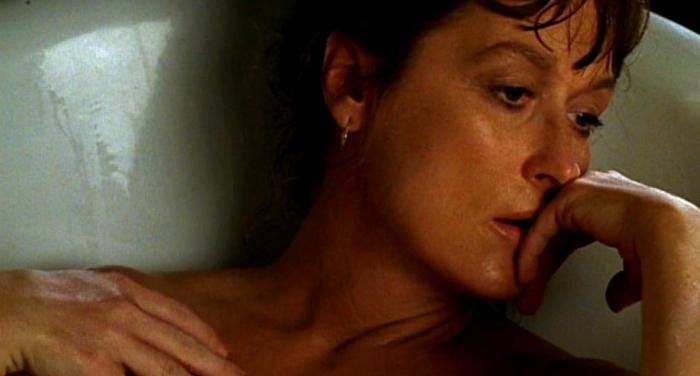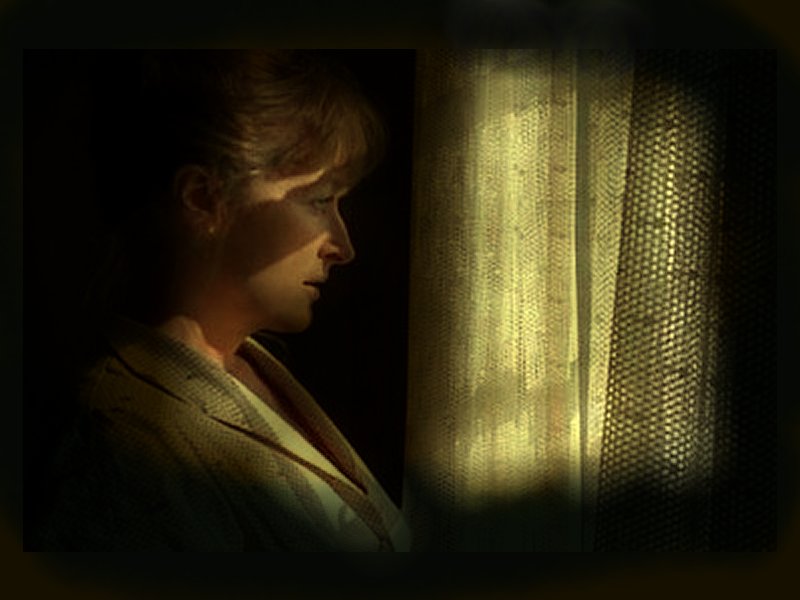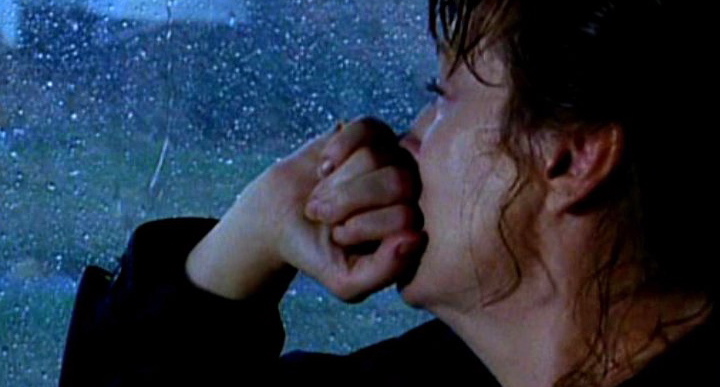|
home | what's new | other sites | contact | about |
||
|
Word Gems exploring self-realization, sacred personhood, and full humanity
Francesca and Robert
Wikipedia: "The Bridges of Madison County is a 1995 American romantic drama film based on the best-selling novel of the same name by Robert James Waller. It was produced by Amblin Entertainment and Malpaso Productions, and distributed by Warner Bros. Entertainment. The film was produced and directed by Clint Eastwood with Kathleen Kennedy as co-producer and the screenplay was adapted by Richard LaGravenese. The film is about an Italian war bride, Francesca (Meryl Streep), who lives with her husband and two children on a farm in Iowa. In 1965, she meets a National Geographic photographer named Robert (Clint Eastwood) and has a four-day extramarital affair with him that changes both their lives forever. The film earned $182 million worldwide and was well received by critics. Streep received an Academy Award for Best Actress nomination in 1996 for her performance in the film."
The Bridges Of Madison County presents one of the more provocative love stories of recent time. Francesca is faced with a moral dilemma: She believes Robert to be her true love. Should she leave her husband, Richard, and her two teenage children, to be with Robert? She decides to stay. She lives her remaining life without seeing Robert again. I thought it instructive to explore what she might say to us today about her decision then. Before she died, she offered clues as to how she might choose if she had it to do over. Her perspective, presented in the following interview, is tempered by her experience in the afterlife as an evolved soul.
an interview with Francesca Johnson
Interviewer: Francesca, your mortal life continued some decades after your last meeting with Robert. What was it like for you during that subsequent time? Francesca: It is strange, but I hardly remember my life after Robert left. Of course, I was busy with many things, but there was not a day that went by that I didn't think of Robert; not a day that I did not go back to the time when we were together; not a day that I did not wish to be with him.
Interviewer: We assume that you are with Robert now? Francesca: Yes, of course, I am with Robert. Interviewer: Do you ever see Richard? Francesca: Not so much. I mean, we are friendly, but we both understand that we did not have a lasting bond. Interviewer: What you did back then - I want you to know that - many people admire your courage. It was very noble of you to sacrifice yourself for the good of your children and your husband. Francesca: You are very kind... but… if I may say so, you are more kind than realistic. Interviewer: What do you mean, Francesca? Francesca: Allow me to put it this way. I see life differently now than I did in the 1960s; actually, I began to see some things very clearly even before I passed over. Interviewer: Are you saying that you made the wrong choice back then? Francesca: I don't want to be misunderstood. These are weighty issues. What I did 50 years ago may have been the right decision then - but only because I was still quite immature. At any given moment, one can only be what one is. I made a decision based on what I knew at the time. It seemed to be the right thing to do. But if you're asking me, would I make the same choice today, I would tell you no.
Kahlil Gibran, The Beloved: "For some hidden wisdom, Heaven willed that I spend my life with a man though I was created for another. I will spend this life in silence, as Heaven wills. When the gates of eternity open, I will be joined to my fair half."
Interviewer: Please say more about this. I understand that your life on the other side provides a perspective that escapes most of us here - but, you seemed to indicate back then that the feelings you had with Robert would end if you had gone with him, and that your duties to your children and husband were paramount for you. Should not duties to family supersede? Francesca: At that time, I thought the best interests of everyone would be served if I stayed on the farm -- best for the kids, Richard, Robert, and even myself. As it turned out, I couldn’t have been more wrong; everyone was hurt by my decision; everyone lost, no one gained. Interviewer: Could you explain this last statement? - your children, of course, still had a mother. Richard still had a wife. Francesca: Did they? I have come to see that everyone would have been better off had I gone with Robert. Interviewer: Please help us to understand your current thinking. Francesca: Do you remember what my son Michael said to his sister Carolyn when they were going over my papers? He indicated that he was personally offended that I might love another man; that he saw himself as a kind of Prince in the family, implying that I, his mother, was one of his subjects, and that he had some sort of right to control my life. Is this not a diseased viewpoint? Interviewer: (silence) Francesca: I'd like to ask the question, where did Michael get this idea about being a Prince? about seeing wives and sisters in a demeaning way? Well, I’ll tell you. He got it from our family life, of course. Michael became arrogant and unrealistic in his views toward women because I inadvertently encouraged this. He witnessed me living my life without self-respect, unwarrantedly servile, and therefore he saw no reason to see me otherwise. Interviewer: You mean, he began to see all women the way Richard viewed you? Francesca: Exactly. In our house, Michael learned that a woman is not a true entity. She existed only at the pleasure of her husband. Michael saw me give up my teaching job, which I dearly loved, and where I was doing important work. And why? Because Richard, as lord of the manor, on a whim, decided that his "little woman" should be kept at home! I had no say in the matter. Interviewer: I see. Francesca: And this demeaning view of women negatively affected Michael's own marriage, his relationship with his wife. Interviewer: How was Carolyn affected? Francesca: Carolyn was even more vulnerable and was hurt very much. Children are not stupid. Children see everything. More than this, they feel everything. They immediately and intuitively know if love is present in the home or not. You cannot hide this desolation from them.
Dr. David Amen: "Research shows that it's better for children to be from divorced parents than to live with chronic conflict."
Francesca: You cannot put on your daily smiley face and think the children will be fooled. It doesn't work that way. They instantly sense, their radar is so up, as they feel the interpersonal negative energy in the home. Both Michael and Carolyn, if only on a subliminal level, understood that Richard and I endured a loveless marriage. And Carolyn entered adult life laden with the empty moralistic concept that a "good" woman stays in a loveless marriage, even if it destroys her! All of this lack of self-respect hurt my daughter a great deal. Interviewer: And that's why the first thing Carolyn did, after reading your private journal among the estate papers, was to call her husband, who did not love her, and tell him that she wasn't coming home. Francesca: She finally understood enough, and was strong enough, to break away from my too-submissive example, that hurtful model of the "good little girl," who always obeys and is always loyal, no matter the cost. I'm glad she wasn't too old to have the chance to find love in this life. Interviewer: And Richard? Francesca: Yes, Richard. I have come to see that Richard meant me no harm. Richard was a good man and worked hard for his family. His controlling and insensitive ways, however, were learned from his own dysfunctional parents -- it's just the way things were done at that time and in that culture. He thought he was supposed to treat women as he did. Interviewer: You had stated that Richard would not do well without you. Francesca: Yes, I said that. I overstated the case. If I had left, Richard would have been disoriented for a time, but he is not helpless. He is a war veteran and has been through ordeals. After a while he would have married one of the local widows or single women. Also, Richard was not served, in a spiritual sense, by my staying. I reinforced his dysfunction by not standing up to him, and he is suffering with an entrenched darkness in the afterlife. It would have been better for him to wake up to the fact that I am a real person with real desires and real goals. He had no right to treat me as a pawn and plaything in his life, and now he has to work his way out of that Machiavellianism in this next world. But this merchandizing of people is what the world calls marriage. Interviewer: You said that you and Robert could not sustain what you had if you'd left with him. How do you feel about that now? Francesca: On the day that he left, I was incredibly torn by so many tortured feelings and confused emotions. I was also moved by a sense of guilt. I felt bad because "good little girls" who are married are not supposed to fall in love with other men. I did not know how to deal with this. When I said that what Robert and I had would end if we left together, this was the voice of my guilt speaking, my immature self. My deeper True Self was telling me the opposite, that what we had was real, but I was not yet strong enough, and mature enough, to listen to it. I want to emphasize this point. Living with Richard had damaged my spirit. My self-confidence was quite low. As a result, my fears got the best of me when Robert asked me to leave with him. I was not ready to receive the love of my life. He was right there in front of me, but I was not put-together enough as a person, I did not love myself enough, to be able to accept him and be with him.
Interviewer: Your children read in your journal about doing whatever you have to do to find happiness in this life. Could this be misinterpreted as hedonism?
Kahlil Gibran, The Beloved: "I was like an inviting table, and [my husband] Rasheed would come to me whenever he felt a need to taste of it; but our souls remained far apart... in this sinful marriage."
Francesca: It could be misunderstood, so allow me to clarify. I am not advocating living a life of wanton abandonment. I think you know that I am not that kind of shallow person. What I am saying is that each person is as worthy of love and happiness as anyone else. That includes me. Of course, if children are very little, they need a mother, and one needs to be mindful of that. But my teens were not babies. The important point I leave for my children, and for all, is this: No one is well served by living the life of a second-class person. The subliminal message that I presented to my children negatively influenced them for a long time, hurt their future marriages and their own spiritual development. They would have done much better, would have been happier, had I been more self-respecting, had I lived a courageous life by following my inner truth. I hurt myself, and them, by a fearful hiding from reality. I regret not leaving them a legacy of authenticity. Interviewer: We have not spoken much about Robert. Is there anything you would have us know about him? Francesca: Thank you for asking about him. Your comment about my not mentioning Robert is ironic as he is never far from my thoughts. I owe so much to him. Sometimes I still laugh to myself about that story he told about the gorilla, and that "we're still writing to each other." He is so funny. But, more than amusement, Robert is my life. He introduced me to a better way of thinking; he taught me to like myself, and I will always love him so much for that. I would always love him anyway, but, if it were possible, even more now. Interviewer: It's said that in true romance lovers are a kind of savior to each other. Francesca: Robert was ahead of me then, more mature. He saw things I wasn't ready for. He had a sense about true love that's rare. He said that hardly anyone in this world experiences the authentic, permanent love -- and that most people don't even believe that it exists. Interviewer: He talks like Love Personified in The Wedding Song. Francesca: (sighing) I guess I was one of those too afraid to believe in true love. He was so high-minded, and with a good measure of agape-love, too. I was offended by his lofty concept of "loving everybody" as I felt threatened by this. I didn't want to share him with anyone. He wasn't afraid to live life without anchor or compass. He made me nervous with his talk about "living here and living there" and not having a definite place to be. I found out the hard way that having a definite place to be, without the one you love, is being nowhere at all. Later, in my weeping, I would learn that "my home" is, and would always be, wherever Robert is.
Interviewer: What is the very most important lesson you learned from Robert? Francesca: That's easy. I always remember when he said, "Most people are afraid of change, but if you look at it like it’s something you can always count on, then it can be a comfort." Interviewer: Tell us what he really meant by that. Francesca: Well, as I've indicated, at the time I was a little fearful and closed-minded in my thinking. I was afraid of change. Robert meant that if we are to evolve as human beings we must become comfortable with growth and change. Whatever small portion of truth we currently possess, whatever we think we know, whatever we are, we must hold loosely in our hands... because there's always so much more to come! Interviewer: Francesca, you are a beautiful person. Thank you for speaking with us. I wish you and Robert all the best. Francesca: Thank you, but we already have the best, my friend, and so I will leave that wish for you in your life.
Kairissi. All of these stories are deeply moving. Each one, on the positive side, reflects the mind of God in a certain way; but, equally so, each highlights a particular aspect of the dysfunctional ego. Elenchus. How would you characterize the love of Francesca and Robert? K. Immediately coming to mind is Francesca’s problem of not being ready. Her destined love showed up on her doorstep one day, but her own lack of self-respect, her inner “good little girl” chaos, would keep them apart for the duration. E. Here’s one irony that I see. Francesca enjoyed the security of deep roots in a well-ordered life. Richard had inherited the farm from his parents, and so they had no mortgage on their hundreds or thousands of acres of prime Iowa farmland.
E. Modest appearances to the contrary, they were quite wealthy. And she had two fine children, and a respectable husband, all of which gave her and the family a sturdy and enviable presence in the community. And yet, inwardly, she was a mess. K. Subliminally, she’d identified with all that farmland. This is why she boiled over when Robert started talking about “I could live here, or I could live there, it doesn’t matter.” Visions of rootlessness frightened her. And the big irony was that Robert was the putative vagabond, yet he was the one inwardly settled and whole. She had a thousand acres of farmland but, within her secret person, was driven by a sense of impermanence. Robert had come to terms with change, but how threatened she was even by the thought of “having no place to lay her head.” E. Life was setting her up for a great lesson. She would soon learn, very painfully, a better definition of “home,” which was, of course, Robert’s warm embrace. K. But, he would be gone by then. She didn’t even know how miserable she was until Robert came, but she’d gain even more clarity on this after he was gone. E. She had to first “get back to zero” to see clearly the problem of her own emotional destitution. K. I just can’t get over it: Robert drives into her farmyard, comes right to her doorstep; it’s like her eternal Twin is “delivered by UPS.” But she’s nowhere near ready to truly receive him. This story is a great “placard” to all those who think that “just show me my Twin Soul and we’ll live happily ever after.” There’s a lot more to it than that: You have to be ready. E. She hadn’t yet “made her music pure.” K. I think her insight into what happened to her kids is very important. So often two will remain in a loveless marriage “for the children.” What a terrible idea. Granted, as she said, if children are little, they will need a mom, but this doesn’t mean that mom and dad have to sleep together or “play house.” But Francesca’s kids were like 15 or 16. She could have even made a deal with Robert to let her work with the kids, be near them, for another year or so, if she felt that were necessary. So much could have been done with a little planning and negotiation. I’m sure Robert would have waited a year or two for her; and, of course, they could have seen each other during that time, or even been with each other. E. Francesca really handled this badly. There was a way to work out the details of a good transition. K. It was her fear-and-guilt and her self-disrespect; that was her main problem. E. And so they had to wait another 30 or 40 years until both of them reached Summerland. It didn’t have to be that hard. I’m sure that Robert died younger than he might have in his weeping for her. K. I think, in their story, Gibran’s “sinful marriage” takes on new levels of meaning. E. Their story becomes a parable of modern perverted ideas of morality. K. As Heloise said, who’s the true immoral woman? the fear-and-guilt laden one who sells her body in a “sinful marriage” for a fleeting security and homage to “local manners”? or the courageous woman who will not be intimidated by collective-ego-institution definitions of morality, lives by her inner truth, and follows her sacred feminine intuitions? E. I am inspired, too, by Francesca's realization: "Robert taught me to like myself." His tremendous gift of cherishing her unconditionally, and the memory of it, finally helped her to break out of cultish modes of thought and into self-respect. Is there a truer test of Twin Soul love? K. Possibly not; but a close second is arranging to have one's cremated ashes cast at a site meaningful to the history of their love. This is what you do when there is no family burial plot. And, by "family," I mean she and Robert as "family," the truest family of her heart and life.
|
||
|
|




